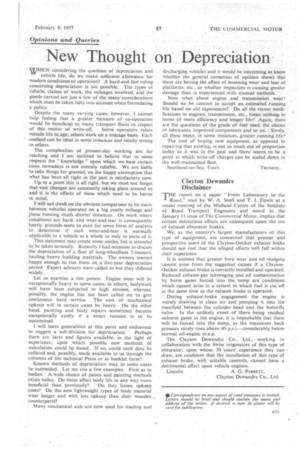Opinions and Queries
Page 57

If you've noticed an error in this article please click here to report it so we can fix it.
New Thought on Depreciation
WHEN considering the question of depreciation and
vehicle life, do we make sufficient allowance for modern conditions.of operation? A hard-and-fast ruling" concerning depreciation is not possible. The types of vehicle, classes of work, the mileages involved, and the goods carried are just a few of the many considerations which must be taken fully into account when formulating a policy.
Despite the many varying ca.ses, however, I cannot help feeling that a greater measure of co-operation would be beneficial to many transport fleets in. respect of this matter of write-off. Some operators relate vehicle life to age; others work on a mileage basis. Each method can be ideal in some instances and totally wrong in others.
The complexities of present-day working are far reaching and I am inclined to believe that in some respects the " knowledge " upon which we base certain costs nowadays is not entirely reliable. We are liable to take things for granted, on the happy assumption that what has been all right in the past is satisfactory now.
Up to a point this is all right, but we must not forget that vast changes are constantly taking place around us and it is the effects of these which need to be borne in mind.
will not dwell on the obvious comparison to be made between vehicles operated on a big yearly mileage and those running much shorter distances. On work where conditions are hard, and wear-and-tear is consequently heavy, grounds seem to exist for some form of analysis to determine if such wear-and-tear is normally applicable to a vehicle as a whole or only to parts of it.
This statement may create some smiles, but is intended to be taken seriously. Recently I had occasion to discuss the depreciation of a fleet of long-wheelbase 5-tonners. hauling heavy building materials. The owners seemed happy enough to run them on a five-year depreciation period. .Expert advisers were•called in but they differed widely.
Let us examine a few points. Engine wear will be exceptionally heavy in some cases; in others, bodywork will have been subjected to high stresses, whereas, possibly, the engine has not been called on to give continuous hard service. The cost of ' mechanical upkeep will in certain cases . be heavy. On the other hand, painting and body repairs sometimes become exceptionally costly if a smart turnout is to be maintained.
I will leave generalities at this point and endeavour to suggest a sub-division for depreciation. Perhaps there are facts and figures available, in the light of experience, upon which possible new methods of calculation could be based. If so, could such data be collated and, possibly, made available to us through the columns of the technical Press or in booklet form?
Known methods of depreciation may in some cases be outmoded. Let me cite a few examples. First as to bodies. A wide choice of paints and painting methods exists today. Do these affect body life in any way more beneficial than previously? Do they lessen upkeep costs? Do the new lightweight types of body material wear longer and with less upkeep than their wooden, counterparts?
Many mechanical aids are now used for loading and discharging vehicles and it would be interesting to know whether the general consensus of opinion shows that these are having the effect of lessening wear and tear of platforms, etc., or whether impaction is causing greater damage than is experienced with manual methods.
Now what about engine and transmission wear'? Should we be content to accept an estimated running life based on old'experiences? Do all the recent modifications to engines, transmission, etc., mean nothing in terms of more efficiency and longer life? Again, there are the questions of the grade of fuel used, the choice of lubricants, improved components and so on. Surely, all these mean, in some instances, greater running life?
The cost of buying new equipment, as opposed to repairing that existing, is not so much out of proportion today as it was in the past and there seems to be a point at which write-off charges can be scaled down in the well-maintained fleet.
Southend-on-Sea, Essex. TRUNKTE.
Clayton Dewandre Disclaimer .
THE report on a paper "From Laboratory tothe Road," read by W. A. Snell and T. L_Fowle at a recent meeting of the Midland Centre of the Institute. of Road Transport Engineers and noted in the January 11 issue of The Commercial Motor, implies that certain deleterious effects are consequent upon the use of exhaust obturator brakes.
We, as the country's largest manufacturers of this type of equipment, are concerned that present andprospective users of the Clayton-Oetiker exhaust brake should not feel that the alleged effects will fall within their experience.
It is insisted that greater bore wear and oil sluclging cannot arise from the suggested causes if a ClaytonOetiker exhaust brake is correctly installed and operated. Reduced exhaust-gas scavenging and oil contamination by burnt gases forced into the sump are conditions which cannot arise in a system in which fuel is cut off at the same time as the exhaust brake is operated.
During exhaust-brake engagement the engine ismerely drawing in clean air and pumping it into the manifold between the cylinder head and the butterfly valve. In the unlikely event of there being residual unburnt gases in the engine, it is improbable that these will be forced into the sump, as the maximum back pressure rarely rises above 40 p.s.i.—considerably below normal oil-engine m.e.p.
The Clayton Dewandre Co., Ltd., working in collaboration with the Swiss originators of this type of obturator, upon whose 30 years' experience they can draw, are confident that the installation of this type of exhaust brake, with suitable controls, cannot have a detrimental effect upon vehicle engines.
Lincoln. A. G. PARRETT, Clayton Dewandre Co., Ltd.




































































































